Paolo Ruffini: Communicating is not just connecting, but sharing and caring
The prefect of the Dicastery for Communication signs the preface of the Lev book "Communicate", which includes the ten Messages of Pope Francis for the World Day of Social Communications
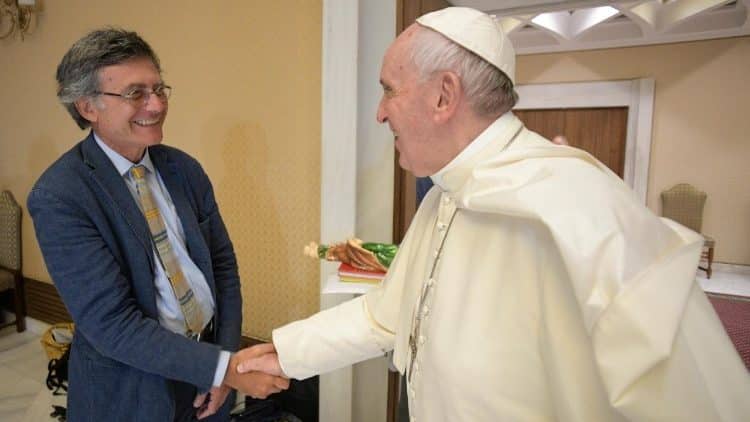
The book “Communicate” has been edited by Vincenzo Varagona, president of the Italian Catholic Press Union (Ucsi), RAI journalist for 35 years and now collaborator of Avvenire, and by Salvatore Di Salvo, national secretary of the Ucsi, director of the weekly Camino and contributor to the Giornale di Sicilia.
The authors of the contributions are Marco Ansaldo, Alessandro Banfi, Carlo Bartoli, Paolo Borrometi, Aldo Cazzullo, Alessandra Costante, Asmae Dachan, Marco Damilano, Giuseppe Fiorello, Luciano Fontana, Sara Lucaroni, Simone Massi, Maurizio Molinari, Andrea Monda, Salvo Noè, Agnese Pini, Gianni Riotta, Nello Scavo, Andrea Tornielli, Mariagrazia Villa.
Paolo Ruffini
Communicating is not just connecting. 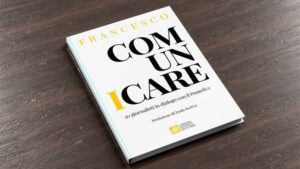 In practically all of his Messages for the World Day of Social Communications, Pope Francis has repeated this warning, turning it into the “red thread” of his teaching. It’s not enough to connect. It is necessary to take care. To share and to care.
In practically all of his Messages for the World Day of Social Communications, Pope Francis has repeated this warning, turning it into the “red thread” of his teaching. It’s not enough to connect. It is necessary to take care. To share and to care.
To share: The world of television has reduced the share to a number that measures a mass; to an index that serves to weight the value of advertising investments. On the other hand, if there is greatness to measure, it is that of plenitude, that of beauty, that of this share. It is a greatness that lies in its uniqueness.
To care, I care: today’s world has almost erased the idea that I could be interested in something other than our own interest.
At most we worry about the way progress seems to gratify our desires.
We are so fascinated by the catalog of possibilities that digital communication technology unfolds before our eyes, that we run the risk of being left in the end without words, without gestures, without images, without anything to communicate, prisoners of ourselves, of our fears. , of our narcissism; embodying the paradox of maximum connection and minimum communication; changing form for content.
The Messages of Pope Francis for the World Day of Social Communications are part of this framework.
The Church has always considered communication co-essential to its mission; and has always accepted the challenge of the times.
We could cite the Letters of Saint Paul, James, Saint Peter and Saint John as the first form of communication along with the Gospels. And the Acts of the Apostles as a narrative, communication, fruit of communion. We could find in the Regula pastoralis of Pope Gregory I of 590 a beautiful theological-pastoral reflection on the criteria for discerning – with the heart – when to speak and when to remain silent: “Let the shepherd be shrewd in remaining silent and quick in speaking, so as not to say the that one must remain silent and not overlook in silence what must be revealed.
And we could even find in this quote so far from us a resonance with what Pope Francis writes in his 2023 Message about the duty of not being afraid to proclaim the truth, even if it is sometimes uncomfortable, and at the same time also the duty to guard against doing it without charity, without heart.
One thing above all Francis repeats to us every year with his Messages; and it is exactly this: the importance of communicating with the heart, of “speaking with the heart”, of listening with the heart, of also being silent with the heart.
As the Pope writes in his 2017 Message: “Our ancient fathers in faith already spoke of the human mind as a millstone that, moved by water, cannot be stopped. Whoever is in charge of the mill, however , can decide whether to grind wheat or tares. The human mind is always in action and cannot stop “grinding” what it receives, but it is up to us to decide what material to provide (cf. Cassian the Roman, Letter to Leontius the Higumen) “.
“We are all called to seek and speak the truth and to do so with charity (…) to guard the tongue of evil (cf. Ps 34:14)” (Francis, Message for the LVII Day of Social Communications, January 24 2023).
Listening is, however, the first indispensable ingredient of dialogue and good communication. It is not communicated if it has not been heard first and good journalism is not done without knowing how to listen (cf. Francisco, Message for the LVI Day of Social Communications, January 24, 2022).
Unthinkable just a few decades ago. But there are – there will always be – things that technology cannot replace. Like freedom. Like the miracle of the meeting between people. Like the surprise of the unexpected. The conversion. The spark of ingenuity. Free love. Here is the root of all communication. That is why connection alone is not enough.
Communication is often talked about in a functional way.
The teaching of the Church is almost the opposite.
There may be marketing, advertising, connection. But without real connection there is no true communication.
Here lies the real reason for the media crisis.
The dynamics of the media and the digital world – writes Pope Francis in Laudato si’ – when they become omnipresent, do not favor the development of the capacity to live wisely, to think deeply, to love generously. The great wise men of the past, in this context, would run the risk of seeing their wisdom suffocated in the midst of the dispersive noise of information.
We are flooded with unverified information, without context, without memory, without conscious reading.
The primacy of speed often prevents control, verification, discernment. Feed the chatter.
In a time when technology is in danger of becoming technocracy, we should witness a new Christian humanism, in which technology is for man and not against man.
The digital world does not stop. It is up to us to guide it towards good.
It will not be an algorithm that reveals the good to us. In any case, it is up to us to direct the algorithm towards good.
Pope Francis also responds to this, when he invites us to use love (the only thing that machines and algorithms exclude) as a norm for our way of telling the truth. The problem we face is: how can one be captivating without becoming evil, how can one generate information that does not degenerate, how can one avoid being complicit in a false interpretation of reality? How to discern what is true from what is not, truth from post-truth, events from pseudo-events, facts from factoids?
I think the solution is to rediscover the importance of being on top of life, fully present, rather than simply on the line.
Several times Pope Francis has invited communicators to avoid the excesses of slogans, which instead of launching thought, annul it; and to take the long path of understanding instead of the short one that he believes he will immediately find either the saviors of the country, capable of solving all the problems on their own, or scapegoats on whom to dump all responsibility.
Many times he has warned against trusting those who say things half-heartedly, because they misinform with the alibi of informing, prevent accurate judgment about reality and lead to error.
Many times he has stigmatized the alternation between two opposite evils, equally harmful: catastrophic alarmism and consoling misunderstanding, the most serious of which is misinformation, because it leads to error, to making mistakes; leads to believing only part of the truth.
Now artificial intelligence challenges us.
But human intelligence has a resource that the machine does not have: the heart, the feeling.
“Communication is (…) an achievement that is more human than technological,” Francis stated in 2014, with his first Message for the World Day of Social Communications. And he did so by surprisingly choosing a parable different from those usually used to talk about communication, that of the Good Samaritan, because it helps us – he said – to think about the power of communication in terms of proximity: “Even the world of “The media cannot be alien to the care of humanity and is called to express tenderness. The digital network can be a place rich in humanity, a network not of cables, but of human people.”
In this beginning everything is already there. And above all, between the lines there is the recognition of communication (and journalism) as a mission, as stated in the 2015 Message: “In a world in which people so often curse, speak badly, sow discord, “pollutes with gossip (…) blessing instead of cursing, visiting instead of rejecting, welcoming instead of fighting is the only way to break the spiral of evil, to bear witness that good is always possible.”
Although aware of the extraordinary power of technology, and also of rhetoric, Pope Francis rejects both temptations: the technocratic and the propagandistic. “It is not technology that determines whether communication is authentic or not, but the heart of man and his ability to use well the means at his disposal” (Francis, Message for the L World Day of Social Communications, January 24 of 2016).
Marketing is not the model of good communication. If not the testimony of those who know how to see, those who know how to listen, and those who know how to become neighbors.
This is also the best way to fight fake news:
The best antidote to falsehoods is not strategies, but people, people who, free from greed, are willing to listen, and allow the truth to emerge through the fatigue of sincere dialogue; people who, attracted by the good, take responsibility in the use of language. If the way to avoid the spread of misinformation is responsibility, the one who has a special commitment is the one who, due to his job, has the responsibility of informing, that is: the journalist, custodian of the news. This, in the contemporary world, does not just carry out a job, but a true mission. He has the task, in the frenzy of the news and the whirlwind of scoops, to remember that at the center of the news is not the speed of delivery and the impact on audience figures, but the people. Informing is training, it is getting involved in people’s lives. (Francis, Message for the LII World Day of Social Communications, January 24, 2018).
In the hyperconnected and fragmented world, this is – according to Francis – the network that men and women of good will committed to communication must weave, “a network made not to trap, but to liberate” (Francis, Message for the LIII Day World of Social Communications, January 24, 2019); to share stories that demand to be shared, told, made to live in every time, in every language, in every medium (cf. Francisco, Message for the LIII World Day of Social Communications, January 24, 2019).
Among the wonderful things that the human soul is capable of, before any technical invention, is this in fact: the ability to share.
In such a dark moment in human history, only by truly sharing can we find a way to restore the soul to every wonderful technical invention and our communication.
Only in this way does communication become communion and open true processes of development of good, of peace.
This is not – as Pope Francis has said – about promoting “do-gooder” journalism that denies the existence of serious problems and adopts corny tones. If not, on the contrary, journalism without pretense, hostile to falsehoods, catchphrases and grandiose statements; journalism done by the people and for the people; a journalism that does not burn the news, but is committed to searching for the real causes of conflicts, to promote their understanding from their roots and their overcoming; a journalism committed to pointing out alternative solutions to the escalation of clamor and verbal violence.
Therefore, inspired by a Franciscan prayer, Francis – in the 2018 and 2021 Messages – wrote two prayers for journalism that challenge even non-believers to undertake a journey and that are the best conclusion to these lines.
- Lord, make us instruments of your peace.
- Make us recognize the evil that is insinuated in a communication that does not create communion.
- Make us capable of removing the poison from our judgments.
- Help us to speak of others as brothers and sisters.
- You are faithful and trustworthy; make our words seeds of good for the world:
- where there is noise, make us practice listening;
- where there is confusion, let us inspire harmony;
- where there is ambiguity, let us bring clarity;
- where there is exclusion, make us share;
- where there is sensationalism, make us use sobriety;
- where there is superficiality, make us ask real questions;
- where there is prejudice, cause us to inspire confidence;
- where there is aggression, make us bring respect;
- where there is falsehood, make us bear truth.
(Francis, Message for the LII World Day of Social Communications, January 24, 2018)
Lord, teach us to get out of ourselves,
and to move towards the search for the truth.
Teach us to go and see,
teach us to listen,
not to cultivate prejudices,
not to jump to conclusions.
Teach us to go where no one wants to go,
to take the time to understand,
to pay attention to the essential,
not to let ourselves be distracted by the superfluous,
to distinguish the misleading appearance from the truth.
Give us the grace to recognize your homes in the world
and the honesty of telling what we have seen.
(Francis, Message for the LV World Day of Social Communications, January 23, 2021)
Related

On April 5 and 6, pilgrims from around the world will celebrate the Jubilee for the Sick
Exaudi Staff
04 April, 2025
4 min
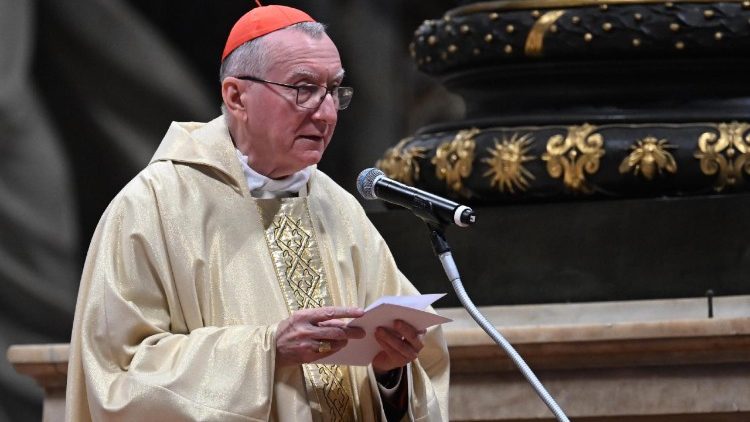
John Paul II: The Tireless Pilgrim Who Continues to Inspire the World
Exaudi Staff
03 April, 2025
2 min
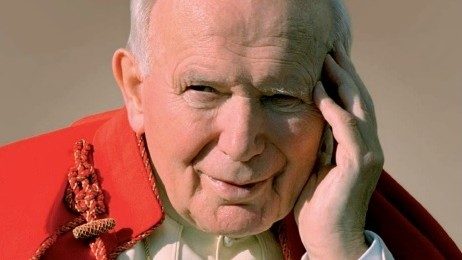
Mass in Commemoration of the 20th Anniversary of the Death of John Paul II
Exaudi Staff
01 April, 2025
1 min
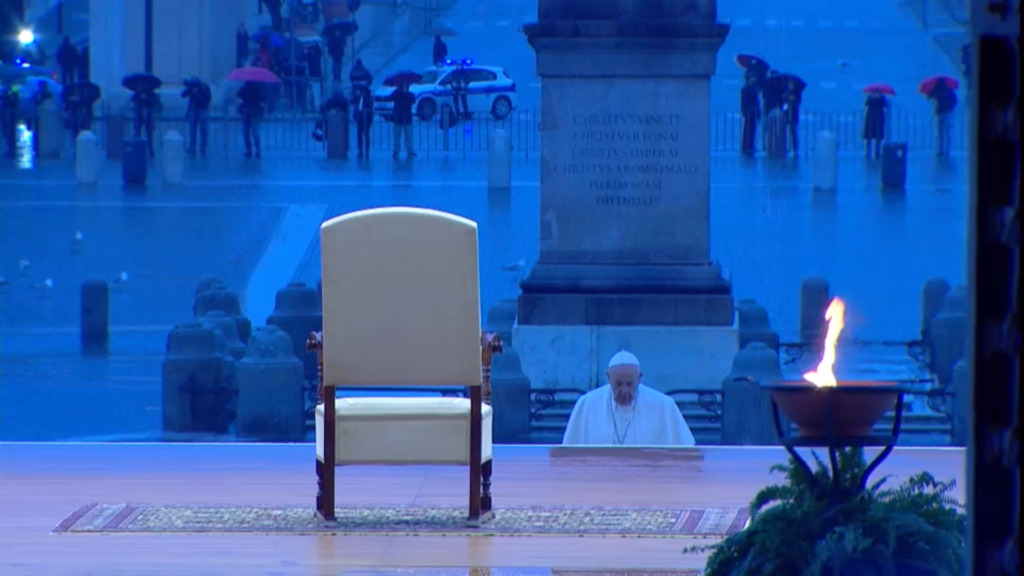
Five Years After Statio Orbis: Hope in the Midst of the Storm
Exaudi Staff
27 March, 2025
2 min
 (EN)
(EN)
 (ES)
(ES)
 (IT)
(IT)

